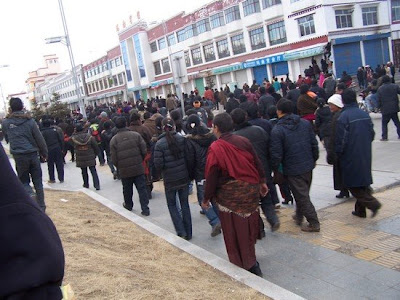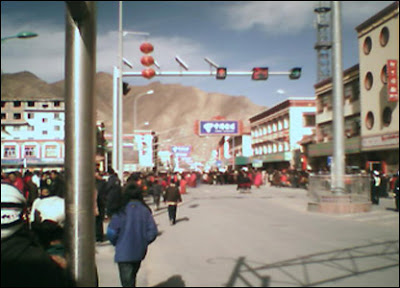| Chinese Police Fire on Tibetan Protesters, Death Toll Unknown |
| KATHMANDU — Paramilitary police in China’s southwestern Sichuan province fired on a crowd of Tibetan protesters demanding the release of two detained monks, killing and wounding an unknown number of people, Radio Free Asia (RFA) reports.
At about 8 p.m. April 3, paramilitary People’s Armed Police fired on a crowd of several hundred monks from the Tongkor monastery in Kardze (in Chinese, Ganzi) and several hundred residents, witnesses told RFA’s Tibetan service.
The witnesses, who declined to be identified, said they believed 15 people were killed and dozens injured, with scores more unaccounted for as of April 4. Phone communication with the region was cut off after the shooting and no further information was available.
China’s official Xinhua news agency reported a “riot” late Thursday outside government offices in the Kardze Tibetan Autonomous Prefecture but made no mention of any deaths. It said one government official was “attacked and seriously wounded” and that police were “forced to fire warning shots and put down the violence.”
A source told RFA’s Cantonese service: “One monk has been killed, and seven Tibetans. Yesterday morning the police came to some Tibetan houses and asked them not to mourn those Tibetans who died in earlier clashes, and not to post the Dalai Lama’s pictures. Then they had a clash with the police. Many people have been beaten up and arrested.”
The unrest around Tongkor monastery—unaffected by recent unrest in Tibetan areas until this week—began after Chinese authorities tried to launch a “patriotic education” campaign there aimed at quashing support for Tibetan demonstrations elsewhere.
But when they tried to enlist the head lama, Lobsang Jamyang, on April 2, he refused, an authoritative source said. He is said to have told the authorities: “We cannot criticize the Dalai Lama, but I will discourage any incidents of protest here.”
He also pledged to consult with the roughly 400 monks in his monastery, calling a meeting at which one monk, Yeshe Nyima, said: “We cannot criticize the Dalai Lama, even at the cost of our lives.” The other monks agreed, witnesses said.
When Lobsang Jamyang recounted this to the police officer in charge, he replied: “We can use the challenge. Tell anyone who wants to rise up to go ahead and rise up, and we will crush them.”
The police also searched the monastery, finding and destroying photos of the Dalai Lama and taking down photos of the monastery’s previous head lama, Tongkor Shabdrung, the witnesses said. Police then arrested a monk named Tsultrim Tenzin, 74, and a lay person identified as Tsultrim Phuntsok, 26, witnesses said.
The following day, some 350 monks and another 350 lay people gathered to demand the men’s release. Officials told them to leave for 25 minutes and calm themselves, and the men would be freed. But the crowd refused to disperse, and at 8 p.m. police opened fire on the crowd at Tongkor subdivision, witnesses said.
Tongkor falls under the administration of Kardze (Ganzi) county, a part of the Kardze Tibetan Autonomous Prefecture. Those reported killed in the shooting include three monks, Samten, 27, Lobsang Rinchen, in his 20s, and Zunde; a man named Phurbu Delek, 30; six women identified as Sangmo, 34, Tenlo, 32, Tsering Yangzom, Tseyang Kyi, 23, Druklot Tso, 34, and Tsering Lhamo; and a young boy. The other victims couldn’t immediately be identified. Two monks, Nyima and Thubten Gelek, were described as “seriously injured.”
Late last month, Xinhua reported that protesters in Kardze attacked police with knives and stones, killing one officer.
Stepped-up patriotic education has been ordered as part of a crackdown on dissent following deadly riots in the Tibetan capital, Lhasa, which began March 14. Authorities say 22 people died. Other reports say up to 140 people were killed in the protests and ensuing crackdown.
A duty officer at the Ganzi County Religious Affairs Bureau denied that any unrest had occurred. “No. Just lies. Who said that?” the official told RFA’s Cantonese service. Asked why monks would have left the monastery, the official replied: “Who said they left the temple? No. Everything is fine.”
Calls to county government offices and the county police station rang unanswered.
An official at the Ganzi Prefecture Public Security Bureau told RFA's Mandarin service: “I haven't heard about this.” But a Han Chinese resident said the unrest had been broadcast on television, saying: “It wasn't a protest. It was beating, smashing, and looting, like bandits. They couldn't have fired shots—from what I saw on television, the police were very restrained, talking to them, advising them."
The shooting came after nearly three weeks of violence and unrest in Tibetan areas of China, in which scores of people are believed to have died and hundreds of people arrested. The Chinese government has effectively locked down Tibetan regions with a massive security presence.
Original reporting by RFA's Tibetan, Cantonese, and Mandarin services. Translation by Karma Dorjee. Tibetan service director: Jigme Ngapo. Cantonese service director: Shiny Li. Mandarin service director: Jennifer Chou. Written and produced in English by Sarah Jackson-Han.
*phayul.com | posted by The Dutch Times @ 1:37 PM  | | | |























































































































Δεν υπάρχουν σχόλια:
Δημοσίευση σχολίου